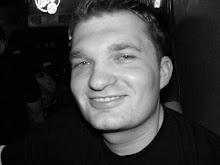Saving Souls and Losing Allies
It was Autumn. The temperature was slowly falling to a bearable 100 or so, and the day until we left Baghdad was drawing nearer and nearer. Ahmed had been dead for a few weeks, yet Ali still talked about him every day we visited with each other. With the mention of his name and a wipe of his eyes, he would look in my eyes and tell me how much he missed his friend. I missed him too. I didn't necessarily believe in a Heaven or a Hell, but, if such things indeed existed, I knew that Ahmed would be welcomed with open arms into anyone's Heaven. He was the most gentle, respectful, funny, and pleasurable kid I had ever known or cared to know, but, most of all, he was Ali's best friend. Through our grief, I think Ali and I silently agreed that we were quietly relieved that Ahmed had not suffered more than he already had. Burn wounds in American hospitals with all the world's best technology were almost unbearable, and Ali and I both knew that Ahmed wasn't in America.
It was another long day at Traffic Headquarters when Ali threw my door open and gazed at me with a puzzled look on his face, pointing to something in his hand. I took the booklet from his hands with the same quizzical look on my face and thumbed through it, right to left, as it was in Arabic. As I went through each page and tried to make sense of it, Ali turned to a page in the middle and pointed frantically at a picture of a man burning in what appeared to be Hell.
"Ahmed?!?" He asked with much strain in his voice and tears in his eyes.
"What? No. Hold on."
I went back and looked through each page again, and, all at once, it dawned on me. I don't speak Arabic, but I read pictures pretty well. This Arabic language comic book portrayed two Arab men in a car or walking down the street (I don't remember now, as it wasn't important) talking about religion. One of them talks about Christianity as opposed to the Islam that the other was holding onto. A few pages later, a bomb blast is seen (a very real and frequent occurrence in Baghdad) and the two men perish (as Ahmed did.) The adamant Muslim finds himself in Hell, burning in the flames and wishing he had converted to Christianity while the newfound Christian ascends to Heaven and is greeted by Jesus and a Cross. Ali again pointed to the page.
"Ahmed?!?"
"No!"
"No Ahmed?!?"
"No. Bullshit!"
"Bullshit?" he asked, with a glint of hope in his voice.
"Yes, bullshit. Mu-zien." I replied in an assuring voice.
I asked him who had given it to him, and he pointed at the humvee parked behind me. Fitch was sitting in the front seat . . . reading the Bible with that smile on his face that followed him anywhere. "Goddamnit, Fitch" I said under my breath. Didn't he realize that this was actually against the Geneva Conventions? Didn't he realize that we weren't missionaries, we weren't Crusaders?
As I thought about walking back there and explaining it to him, Ali sprinted towards him and told him what bullshit he thought Fitch's literature was. I smiled and decided that Ali could take care of himself in this situation. Ali returned, slightly out of breath, and pointed in Fitch's direction. "Bullshit; mu-zien!" he said with a relieved smile on his face.
We sat there together and talked about whatever it was that could entertain the two of us at the moment until it was time to go, and I waved goodbye to him as I watched him collect his cans in his worn down, filthy sandals with a smile on his face.
On the drive "home", I could only think of what was going through Fitch's head when he decided it would be a good thing to imply that Ali's best friend, who had been a Muslim and who had died in a bombing, was burning in Hell as we speak. Did he truly think he was saving a soul? Did he truly think that a young, kind, funny, generous Muslim like Ahmed would burn in eternal flames? If he did, how could he possibly be smiling? I liked Fitch, and I still do, but this really bothered me. It bothered me then, and it bothers me now. It's part of a bigger problem: does he (or others like him) support the war because he thinks it might create a few more Christians or are there other reasons? If he wasn't a Christian, would he worry about what religion dead kids in Baghdad were raised in? What stories does he tell about his time saving souls in Baghdad? Who agrees with him? All these questions run through my head everytime I see his smiling face at school, as we attend the same university. I like Fitch, and I liked him then. It's difficult, however, not to think about how his evangelicalism could have wrecked Ali's world if I wasn't there to comfort him and tell him that it's bullshit . . . it was all bullshit.
I confided in my friend and comrade Aaron this story while we were still in country and he had this to say:
"All their lives, these people have been told that the West is one day going to invade their holy land, pillage their homes, and convert them to Christianity. We can tell them it's not like that all we want, but then we show up and people like Fitch just confirm it. No wonder they don't trust us."
He was right, and it makes me wonder how many Fitches are in Baghdad today, saving souls and losing allies.

No comments:
Post a Comment